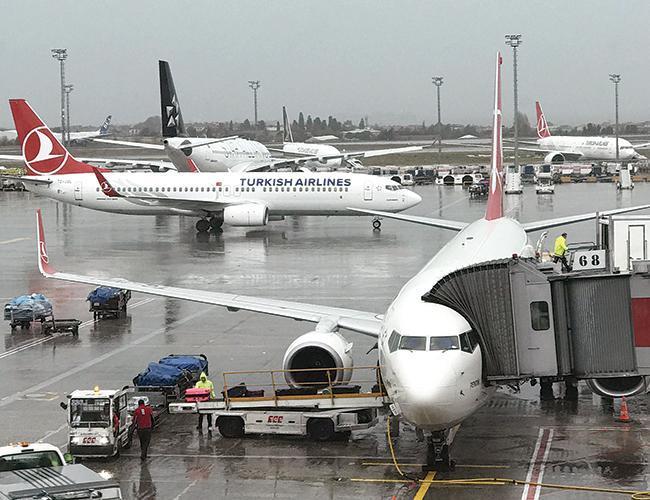Seven flag carriers halt Istanbul flights amid demand slump, rise in Turkish carriers
ISTANBUL

Five European and two American flag carriers have recently stopped their Istanbul flights for a number of reasons, including a demand plunge for Turkish routes, a slot shortage in Istanbul’s main airport, and increasingly competitive Turkish airliners, daily Dünya reported on Dec. 18.
Air France, Iberia, Swiss, Alitalia, Austrian, Air Canada and Delta have halted their Istanbul flights over the last two years, though some have decided to keep flights going through sub-brands.
One of the main reasons for stopping services was a decline in European and American tourists visiting Turkey amid a series of negative developments that hit the tourism sector in 2016, including bomb attacks and a failed coup attempt, according to sector players.
While more than 5.1 million Germans visited Turkey in the first 10 months of 2015, this figure fell to 3.6 million in the same period of 2016, and 3.4 million in the January-October period of this year.
There has also been a notable decrease in arrivals from the U.K., the Netherlands, Austria, France, Italy and Canada in the aforementioned period, official figures have shown.
Iberia said it halted its Istanbul flights because of “a dramatic plunge in demand,” and in May Air Canada cancelled Toronto-Istanbul flights, albeit with plans “to restart them as soon as demand rises again.”
While Turkey saw more than 726,000 arrivals from the U.S., the homeland of Delta, in the first 10 months of 2016, this figure dropped to 304,000 in the same period of 2017, according to the report. Nearly 173,000 tourists came to Turkey from Canada in the first 10 months of 2015, but this figure fell to 69,000 in the same period of 2017.
Turkish carriers, slot issue
Turkish sector players said the rise of Turkish carriers have played a key role. “These developments signal the success of Turkish carriers. Many [foreign] carriers are having trouble competing with us, especially in terms of price,” Pegasus CEO Mehmet Nane told daily Dünya.
In November, Turkish Airlines reached its highest ever November figures, carrying 5.3 million passengers, with an 18.4 percent year-on-year increase. Its load factor rose to 79.5 percent in domestic flights, with a 5.4 percentage point year-on-year increase, and to 78.6 percent in foreign flights, representing a 5.6 percentage point increase.
Describing the flag carriers’ Istanbul decision as “worrisome,” Onur Air CEO Teoman Tosun said escalating political tensions, increased cost-cutting policies, and a slot shortage at the Atatürk Airport have played a key role in the carriers’ decisions.
“The problematic side of this development is the flag carriers’ decision to quit Istanbul. Their sub-brands are still coming but the situation should be different. There used to be a huge traffic load at Atatürk Airport. For instance, when Turkish Airlines held four flights to a destination on a daily basis, foreign carriers wanted to do the same. When they were not able to take these slots, their market share declined. This problem should be solved once the third airport opens though,” said Tosun, who also chairs Turkey’s Private Sector Aviation Enterprises’ Association (TÖSHİD).
“They will return to Istanbul,” Tosun added, stressing that an ease in political tensions would play a crucial role.
















